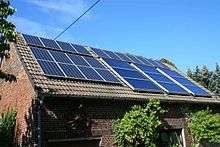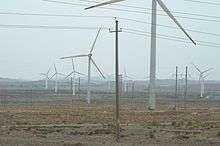Renewable energy is energy generated from natural resources — such as sunlight, wind, rain, tides and geothermal heat — which are renewable (naturally replenished). Renewable energy technologies include solar power, wind power, hydroelectricity, micro hydro, biomass and biofuels.

A combined heat and power solar installation on a barn roof in Germany.
Sourced

Wind turbines in Gansu province, China.
- There is one forecast of which you can already be sure: someday renewable energy will be the only way for people to satisfy their energy needs. Because of the physical, ecological and (therefore) social limits to nuclear and fossil energy use, ultimately nobody will be able to circumvent renewable energy as the solution, even if it turns out to be everybody’s last remaining choice. The question keeping everyone in suspense, however, is whether we shall succeed in making this radical change of energy platforms happen early enough to spare the world irreversible ecological mutilation and political and economic catastrophe.
- Hermann Scheer, member of the German Bundestag and President of the European Association for Renewable Energy, in his book Energy Autonomy: The Economic, Social and Technological Case for Renewable Energy (2006). Routledge Taylor & Francis Group. ISBN 9781844073559.
- More solar energy falls on Earth in one hour than all the energy our civilization consumes in an entire year. If we could harness a tiny fraction of the available solar and wind power, we could supply all our energy needs forever, and without adding any carbon to the atmosphere.
- From the twelfth episode of the U.S. science documentary television series Cosmos: A Spacetime Odyssey, first broadcast on June 1, 2014.
- Although photosynthesis typically has an energy conversion efficiency below three percent, it is, together with heat from the sun, the main energy source of all living organisms, and the energy source from which biomass and fossil fuels are derived. Each year the earth receives an energy input from the sun equal to 15,000 times the world's commercial energy consumption and 100 times the world's proven coal, gas and oil reserves.
- Bernhard Scheffler, quoted by J. Clarke and D. Holt-Biddle in Coming Back to Earth, p. 78 (2002)
- Every percentage point increase in homegrown renewable energy makes us that much more energy secure. The progress in electricity is encouraging, but growth is not yet strong enough in renewable heat and transport to meet the government's objectives.
- Nina Skorupska, chief executive of the UK's Renewable Energy Association, as quoted in "Wind and other renewables generated a fifth of Britain's electricity in early 2014" The Guardian. June 26, 2014.

"I want to tilt the odds in our favor by driving innovation at an unnaturally high pace." - Bill Gates, founder of Microsoft and global philanthropist.
- If you told me that innovation had been frozen and we just have today's technologies, will the world run the climate change experiment? You bet we will. We will not deny India coal plants; we will run the scary experiment of heating up the atmosphere and seeing what happens. The only reason I'm optimistic about this problem is because of innovation. … I want to tilt the odds in our favor by driving innovation at an unnaturally high pace, or more than its current business-as-usual course. I see that as the only thing. I want to call up India someday and say, "Here's a source of energy that is cheaper than your coal plants, and by the way, from a global pollution and local pollution point of view, it's also better."
- Bill Gates, founder of Microsoft and global philanthropist, in "We need an energy miracle" (Interview with Bill Gates). The Atlantic. November 2015 issue.
- Cheaper coal and cheaper gas will not derail the transformation and decarbonisation of the world’s power systems. By 2040, zero-emission energy sources will make up 60% of installed capacity.
- Bloomberg New Energy Finance report entitled "New Energy Outlook 2016 (An annual long-term view of how the world's power markets will evolve in the future)".
- We have long supported a carbon tax as the best policy of those being considered. Replacing the hodge-podge of current, largely ineffective regulations with a revenue-neutral carbon tax would ensure a uniform and predictable cost of carbon across the economy. It would allow market forces to drive solutions. It would maximize transparency, reduce administrative complexity, promote global participation and easily adjust to future developments in our understanding of climate science as well as the policy consequences of these actions.
- Rex Tillerson, Chairman and CEO of ExxonMobil, in a speech entitled "The Path Forward in Today’s Energy Environment" delivered at the 37th Annual Oil and Money Conference in London on October 19, 2016.
- Rather than an eyesore on the roof, it becomes actually a feature of the home. People are going to start wanting to put {building-integrated photovoltaics} on the front side of their home to show that they have solar.
- Christopher Klinga, technical director of the (U.S.-based) Architectural Solar Association, as quoted in "The Next Solar Energy Revolution Is Hiding in Plain Sight." NBCNews.com. April 10, 2017.
- [W]ind and solar power have been rapidly winning market acceptance. Last year, the installed capacity of solar power in the United States nearly doubled. And wind is now being harnessed to produce 5.5 percent of America’s electricity, according to the U.S. Energy Information Administration.
- Norm Alster, journalist, in "Investing in Solar and Wind in a Coal and Oil Moment." The New York Times. April 15, 2017.
- A carbon tax offers the most cost-effective lever to reduce carbon emissions at the scale and speed that is necessary. By correcting a well-known market failure, a carbon tax will send a powerful price signal that harnesses the invisible hand of the marketplace to steer economic actors towards a low-carbon future. . . . A consistently rising carbon price will encourage technological innovation and large-scale infrastructure development.
- "Economists’ Statement on Carbon Dividends: Bipartisan agreement on how to combat climate change." (Statement signed by more than 3,500 economists, including every living former chair of the U.S. Federal Reserve and 27 Nobel laureates.)
- Economists’ Statement on Carbon Dividends (The statement's original publication - subscription required to view in full.) The Wall Street Journal. January 16, 2019.
- Economists’ Statement on Carbon Dividends (Republication - no subscription needed to view.) Republished by the Climate Leadership Council. Originally published on January 16, 2019.
- "Economists’ Statement on Carbon Dividends: Bipartisan agreement on how to combat climate change." (Statement signed by more than 3,500 economists, including every living former chair of the U.S. Federal Reserve and 27 Nobel laureates.)
External links
This article is issued from
Wikiquote.
The text is licensed under Creative
Commons - Attribution - Sharealike.
Additional terms may apply for the media files.